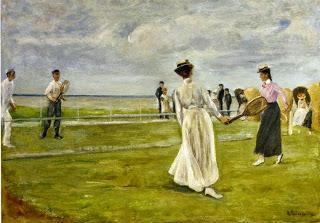Tennis Game by the Sea by Max Lieberman
As the weather warms—even in the Bay Area—I see more and more people out and about, running, biking, playing softball, basketball, and soccer. All of these activities require a bit of “agility” to perform effectively and safely. What exactly do I mean by agility? A standard dictionary definition is “The state or quality of being agile; nimbleness.” In the world of sports medicine, the definition goes a bit further: agility is the ability to maintain or control body position while quickly changing direction during a series of movements.From my vantage point, agility requires all three of our other YFHA physical skills—flexibility, strength and balance—plus the integration of isolated movement skills using a combination of balance, coordination, speed, reflexes, strength, and endurance. The two qualities we have not discussed previously are coordination (a complex interaction between our senses, our mind, and our body) and speed, which is not always needed or encouraged in many modern yoga styles. But as one study below illustrates, our yoga practice as it is may still improve agility, even if poses are done statically.
How does agility relate to our everyday lives? Most of us need to be agile enough to move up and down stairs quickly, traverse a messy room of toys and clothes in a child’s room without tripping and falling, or deftly moving the lawnmower around the yard. And on occasion, we might need to move nimbly through the crowded streets of New York City, as Nina likely is doing on her recent visit there, or through the crowded field of blankets and lawn chairs and seated people at a big music festival as I will need to do this weekend. And these requirements of daily living don’t really change much as we age, even though we may! And for those who still participate in certain sports, like tennis, basketball, soccer, and such, agility will improve your chances of success if winning is a priority!
How does aging affect agility? There are many general changes of aging, many of which we have written about previously at YFHA, that will negatively affect impact agility:
- sarcopenia, where you lose muscle mass and muscle fibers, which will negatively impact slow and fast twitch muscle fibers by influencing the speed and explosiveness of your muscle contractions (turns out we lose more fast-twitch fibers, the ones needed for explosive speed and power)
- gradual changes to our connective tissue that leads to some background stiffness that will also affect our agility negatively
- changes in vision, such as loss of vision, development of cataracts, glaucoma, and macular degeneration, can have a negative impact on agility
- changes to hearing also could affect reaction times that are required for quick, graceful changes in movement
- general slowing of reaction times of the nerves traveling back and forth between you brain and body
What advantages does specific training in agility confer on a person? A research study The influence of agility training on physiological and cognitive performance. done on military recruits that used agility training (AT) vs. standard physical training (PT), found that AT had advantages beyond just improving agility:
“Further, it is potentially more effective than PT in enhancing specific measures of physical and cognitive performance, such as physical agility, memory, and vigilance.”
Yoga practitioners often anecdotally report many of the same findings as well.
As for research looking at Hatha Yoga and agility, at least one study specifically looked at yoga’s effect on agility. The 2009 study conducted in India Study of Hatha Yoga on Agility & Flexibility Level of Human Body by Selected Asanas.looked at the effect of a series of static yoga poses on flexibility and agility and found the study protocol lead to significant improvements in overall agility and flexibility. The poses included:
- Svastikasana
- Mayurasana
- Matsyendrasana
- Paschimottanasana
- Gomukasana
Tennis anyone?
Subscribe to Yoga for Healthy Aging by Email ° Follow Yoga for Healthy Aging on Facebook ° Join this site with Google Friend Connect


